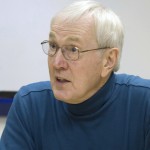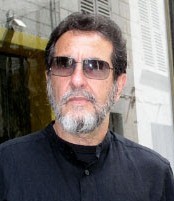 Lenore Weiss grew up in New York City, raised a family in the Bay Area, and currently resides in Louisiana. Lenore’s collections include “Tap Dancing on the Silverado Trail” (Finishing Line Press, 2011), “Sh’ma Yis’rael” (Pudding House Publications, 2007), and “Cutting Down the Last Tree on Easter Island” (West End Press, 2012). Her most recent poetry collection is “Two Places” (Kelsay Books, 2014). She currently teaches a memoir class at Ouachita Parish Library in Monroe, Louisiana and serves as the copy editor of Blue Lyra Review. Her blog resides at www.lenoreweiss.com
Lenore Weiss grew up in New York City, raised a family in the Bay Area, and currently resides in Louisiana. Lenore’s collections include “Tap Dancing on the Silverado Trail” (Finishing Line Press, 2011), “Sh’ma Yis’rael” (Pudding House Publications, 2007), and “Cutting Down the Last Tree on Easter Island” (West End Press, 2012). Her most recent poetry collection is “Two Places” (Kelsay Books, 2014). She currently teaches a memoir class at Ouachita Parish Library in Monroe, Louisiana and serves as the copy editor of Blue Lyra Review. Her blog resides at www.lenoreweiss.com
Lenore, in “Hazardous Turnips” excerpted from Pulp into Paper, the characters at the mill are caught in what has become a common dilemma: rural workers in essentially company towns thankful for their jobs despite growing hardships—including their own health and that of everything around them. How did you decide to concentrate on the subject?
I moved to northeastern Louisiana several years ago and set about familiarizing myself with the area. Two events coincided that led me to write this book. My mate worked for a contractor at the Georgia-Pacific mill in Crossett Arkansas, one of the oldest mills in the Koch Brother’s arsenal. He was assigned to “detention pond” duty with the supposed goal of filtering harmful effluents from the paper making process. I watched him become slowly poisoned by H2S (hydrogen sulfide) and other noxious gases that have been established by the EPA as carcinogens. Every night I heard his terrible cough and stories of company noncompliance with standard industry operating procedures. Around the same time, I met the northeastern Louisiana representative to LEAP (Louisiana Environmental Action Project) who was involved with the Crossett Citizens for Environmental Justice. I began to attend their meetings and researched the history of the mill in Crossett. The book grew out of that experience.


